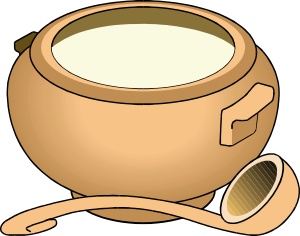The History of Wassailing and Mulled Wine
Wassailing
Wassailing is a very ancient custom that is rarely done today. The word 'wassail' comes from the Anglo-Saxon phrase 'waes hael', which means 'good health'. Originally, the wassail was a drink made of mulled ale, curdled cream, roasted apples, eggs, cloves, ginger, nutmeg and sugar. It was served from huge bowls, often made of silver or pewter.
The Wassail drink mixture was sometimes called 'Lamb's Wool' because of the pulp of the roasted apples looked all frothy and a bit like Lambs Wool! Here is a recipe for wassail.
Wassailing was traditionally done on New Year's Eve and Twelfth Night, but some rich people drank Wassail on all the 12 days of Christmas!
One legend about how Wassailing was created, says that a beautiful Saxon maiden named Rowena presented Prince Vortigen with a bowl of wine while toasting him with the words 'waes hael'.
Over the centuries, a great deal of ceremony developed around the custom of drinking wassail. The bowl was carried into a room with a great fanfare, a traditional carol about the drink was sung, and finally, the steaming hot beverage was served.
The person offering the drink would say "wassail" (good health) and the recipient would reply "drinkhail" (drink good health). From this it developed into another way of saying Merry Christmas to each other!
One of the most popular Wassailing Carols went like this:

Here we come a-wassailing
Among the leaves so green,
Here we come a-wassailing,
So fair to be seen:
Love and joy come to you,
And to you your wassail too,
And God bless you and send you,
A happy New Year,
And God send you,
A happy new year.
Jesus College, in Oxford University, has a Wassail bowl, that is covered with silver. It can hold 10 gallons of drink!

Wassailing Apple Trees
In parts of England (such as Somerset and Sussex) where apples are grown, especially for cider, Wassailing still takes place on Twelfth Night (or sometimes New Year's Eve or even Christmas Eve). People go into apple orchards and then sing songs, make loud noises and dance around to scare off any evil spirits and also to 'wake up' the trees so they will give a good crop! The Wassail is also sometimes poured over the roots of the trees to 'feed' them.
It's also common to place toast which has been soaked in beer or cider into the boughs of the trees to feed and thank the trees for giving apples. That's where the term to 'toast' someone with a drink comes from!
In parts of South Wales in the United Kingdom, there is the tradition of the 'Mari Lwyd' wassailing horse.
Mulled Wine
Mulled wine is an alcoholic drink made by warming red wine and adding other flavors and spices including cinnamon, cloves, star anise and ginger. Sometimes fruit such as oranges and lemons are also added. It's normally served hot/warm but can be also be served cold. Sometimes non-alcoholic wine is used.
The earliest records of warmed wine with spices come from the Romans. They could well have taken this warming drink around Europe. The first 'modern' description of a warm wine drink is in a medieval English cookery book from 1390.
It became more popular during the Victorian period as Wassail was drunk less less with the demise of Twelfth Night parties.
Different variations of mulled wine include 'Smoking Bishop' which is made with port, red wine and lemons or oranges, with the oranges often being studded with cloves. Smoking Bishop was mentioned at the end of A Christmas Carol, by Charles Dickens in 1843, where the reformed Scrooge arranges to talk to Bob Cratchit over a 'Christmas bowl of smoking bishop'.
There are other 'ecclesiastics' including 'Smoking Archbishop' made with claret; 'Smoking Beadle' made with ginger wine and raisins; 'Smoking Cardinal; made with Champagne and 'Smoking Pope' made with burgundy.
In German speaking countries, mulled wine is known as Glühwein and there's also Feuerzangenbowle, where a block of rum-soaked sugarloaf is set alit and sits over and drips into the mulled wine. Mulled wine is known by other names in different countries including glögg, vin chaud, vino caliente, vin brulé and bisschopswijn.
Last Updated: | Sources Information | Written by: James Cooper